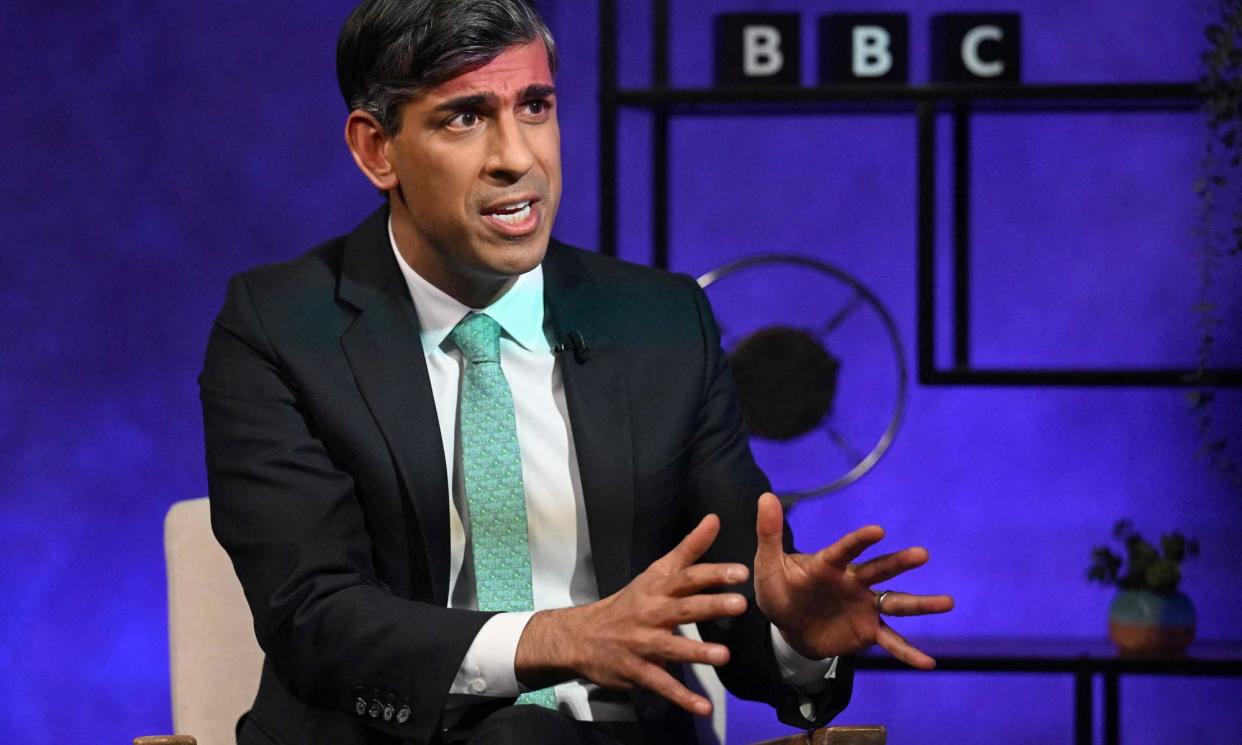Rishi Sunak’s general election interview with the BBC: the key points

Rishi Sunak was the first party leader to sit down with the BBC’s Nick Robinson for the broadcaster’s series of long-form election interviews. Here are the key points from the PM’s grilling.
He still wants to talk about Labour’s ‘£2,000 tax hike’ …
The longest and most torturous part of the interview, with lots of places in which Sunak and Robinson talked over each other, came as the BBC presenter sought to challenge the PM on the Tories’ spending and revenue plans and the largely discredited idea that Treasury forecasts say households would pay £2,000 more tax each under Labour.
Despite much pressing, Sunak would not budge on this attack line – and insisted the Conservatives’ spending plans could be largely financed through tackling tax avoidance and cutting social security payments.
“You’re sounding very like Liz Truss, aren’t you?” Robinson asked at one point. Sunak, unsurprisingly, did not agree.
… but he does not want to talk about Nigel Farage
Despite the Tories openly attacking Reform UK for the first time in the campaign, Sunak declined to condemn Farage for his claim that the PM does not understand “our culture”, condemned by many, including some Tories, as dogwhistle prejudice.
Saying he was “not going to get involved in that”, Sunak then dodged a series of other questions from Robinson about Farage, turning the conversation back to Labour each time.
He evaded the Tories’ record to look to the future
Most incumbent PMs point to what they have achieved in office. In this interview, Sunak again showed his attempt to essentially disregard the past and look only to future promises, a tendency highlighted by Robinson’s probing over the Conservatives’ failure to deliver on promises in areas such as immigration and the NHS.
On waiting lists, Sunak conceded they were getting longer. “We have not made as much progress on NHS waiting lists as I would have liked, and they have risen,” he said. “I think most reasonable people can see that this election is about the future.”
Housing is an issue for the Tories
It is hardly a secret that the UK has a crisis in housing, especially for younger people, and there was little Sunak could do but concede this. Asked if being able to own your own home had become harder under the series of Conservative governments, Sunak replied: “It has got harder and I want to make sure that it’s easier.”
The aspiration will be genuine, but the open acceptance of what has happened was seized on by Labour – it was trailed before the interview was broadcast – with Angela Rayner, the Labour deputy leader, calling it “a damning indictment of 14 years of housing failure”.
His D-day disappearing act remains a burden
Four days after Sunak prompted anger by returning to the UK rather than joining other international leaders for the final events in Normandy to commemorate the 80th anniversary of D-day, this was the subject of the first set of questions from Robinson.
Asked how he felt on seeing the photos of David Cameron in his place at Omaha beach, Sunak replied: “Well, the last thing that I wanted to do was cause anyone any hurt or offence or upset, which is why I apologised unreservedly for the mistake that I made and I can only ask that I hope people can find it within their hearts to forgive me.”
Begging forgiveness from the public, it is fair to say, is not where a prime minister especially wants to be, just over three weeks from polling day.

 Yahoo News
Yahoo News 
